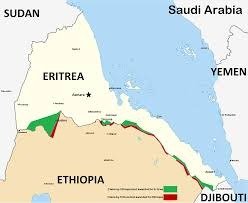Eritrea has accused Ethiopia of exploiting their long-standing border dispute to incite conflict, warning of potential renewed hostilities in the Horn of Africa.
In a statement on social media, Eritrean Minister of Information Yemane Gebremeskel dismissed allegations made by the Tigray Interim Administration (TIA) President, Getachew Reda. Getachew had accused Eritrea of taking advantage of instability in Tigray, referring to the Eritrean regime as a “rogue element” attempting to benefit from regional turmoil.

“I know the Eritrean regime is one of those rogue elements who think they can benefit from chaos in Tigray,” Getachew said during a media briefing in Addis Ababa on Thursday. He claimed Eritrea sees Tigray as a “buffer zone” against potential Ethiopian military action and is using a so-called “illegal” faction of the TPLF to stir conflict.
Former Ethiopian Defense Minister Abraham Belay also weighed in, stating that Eritrean forces continue to occupy parts of Tigray and must withdraw immediately.
“Shabia [Eritrean forces] is inside Tigrayan territory; that is a fact. They must withdraw one hundred percent from our national territory,” he said in an interview with state media.

However, Eritrean Minister Yemane rejected these accusations as baseless, calling them a “pretext for stoking conflict.” He insisted Eritrean troops remain within Eritrea’s sovereign borders and emphasized that Eritrea has no interest in interfering in Ethiopia’s internal affairs or exacerbating divisions within the TPLF.
“As the Pretoria Peace Agreement is an internal Ethiopian affair, Eritrea has no interest in scuttling it,” Yemane said. He urged regional actors to commit to peace and dismissed claims from what he called “conflict entrepreneurs.”
Meanwhile, Tsadkan Gebretensae, a retired general and vice president of the TIA, warned that war between Ethiopia and Eritrea is “inevitable.” In an article published in The Africa Report, he stated that both nations were finalizing preparations for conflict, with Tigray at risk of becoming the main battleground.
“At any moment, war between Ethiopia and Eritrea could break out. It will draw in the whole neighboring region. Sudan and the security of the Red Sea will be directly affected,” Tsadkan wrote, suggesting that Eritrea has a history of exploiting regional instability.
Yemane quickly dismissed Tsadkan’s remarks, stating that “Tigray cannot be the battleground for Ethiopia and Eritrea.” He also accused Tsadkan of pushing a “toxic agenda,” particularly regarding Eritrea’s Assab port.
“Tsadkan openly lamented the Ethiopian regime’s failure to use the 1998-2000 border war to occupy Assab,” he stated, recalling Ethiopia’s unsuccessful attempt to seize the strategic port.
Eritrea’s military presence in disputed border areas of Tigray dates back to its involvement in the 2020-2022 conflict, where it fought alongside Ethiopia’s federal government against the TPLF. Despite a peace agreement, Eritrean troops have remained in contested regions, fueling ongoing tensions.








